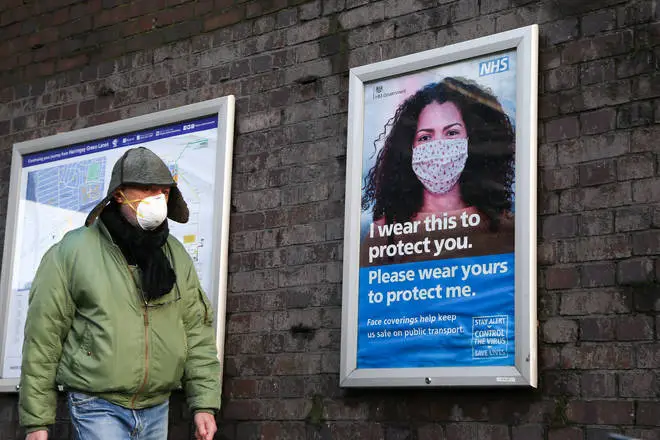
Oli Dugmore 4am - 7am
18 December 2020, 09:19 | Updated: 18 December 2020, 09:24

Long Covid sufferer described debilitating effects of illness
Almost 70 specialist long Covid clinics in England have been opened to help people suffering from the long-term effects of coronavirus, the NHS has announced.
Hundreds of patients are already receiving help from the 69 assessment centres that are taking referrals from GPs of people who could be battling long Covid.
NHS England said patient referrals include those experiencing brain fog, anxiety, depression, breathlessness, fatigue and other debilitating symptoms.
Plans for some 43 clinics were previously announced by NHS England in November, which has provided £10 million for the network.
Read more: 'Long covid' sufferers tell LBC of battling debilitating symptoms that last for months
On the effects of long Covid, sufferer Claire Hastie told LBC's Nick Ferrari she fell ill in March with Covid, and has experienced health problems since then.
She said: "I've got heart issues, I've got chest pain, I've got joint and muscle pain, I've got cognitive issues so I struggle to concentrate and process and retain information, I struggle with my mobility so I need a wheelchair.
"I used to cycle 13 miles and now on a good day I can walk 100 metres slowly."
Earlier this week it was announced that one in five people with coronavirus develop longer term symptoms.

Office for National Statistics data also indicates around 186,000 people suffer problems for up to 12 weeks.
Sir Simon Stevens, chief executive of NHS England, said: "The NHS is taking practical action to help patients suffering ongoing health issues as a result of coronavirus.
"Bringing expert clinicians together in these clinics will deliver an integrated approach to support patients to access vital rehabilitation, as well as helping develop a greater understanding of long Covid and its debilitating symptoms."
Read more: Half of UK could have to wait until 2022 for Covid-19 vaccine
Read more: Tough Tier 3 Covid-19 restrictions come into force across London
The specialist clinics bring together doctors, nurses, physiotherapists and occupational therapists to offer physical and psychological assessments and refer patients to the right treatment and rehabilitation services.
NHS England said 10 sites are in operation in London, seven in the East of England, eight in the Midlands, the South East and the South West respectively, nine in the North West and a further 18 across the North East and Yorkshire.
A further 12 sites are due to launch in January in the East Midlands, Lancashire, Cornwall and the Isle of Wight.
The National Institute for Health and Care Excellence (Nice) is also due to issue official guidance on best practice for recognising, investigating and rehabilitating patients with long Covid.
The "living" guidelines, developed with the Scottish Intercollegiate Guidelines Network (Sign) and the Royal College of General Practitioners (RCGP), will be updated as new evidence relating to long Covid emerges.
They state that people may have "ongoing symptomatic Covid-19" if their symptoms persist from four to 12 weeks and could have "post-Covid-19 syndrome" if symptoms are not resolved after 12 weeks.
The guidelines note there is only "minimal, though evolving" evidence covering long Covid, but set out advice for doctors on how to assess potential sufferers, plan their care and monitor and manage their condition.
One recommendation includes informing patients that it is not known if over-the-counter vitamins or supplements are "helpful, harmful or have no effect in the treatment of new or ongoing symptoms of Covid-19".
The guidelines include an emphasis on the need to address health inequalities in care for people experiencing ongoing symptoms, be that as a result of language barriers, mental health conditions, a learning disability or cultural differences.
They also recommend more proactive follow-up for people from vulnerable or high-risk groups who could be at increased risk of complications.
Sign has also produced a patient booklet to help them understand their illness.